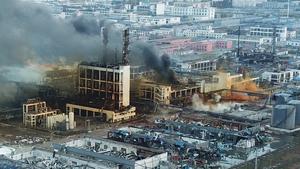 Toxic chemicals in the air dissipating after a massive chemical plant explosion in Yancheng, Jiangsu province on March 21. (PHOTO / IC)
Toxic chemicals in the air dissipating after a massive chemical plant explosion in Yancheng, Jiangsu province on March 21. (PHOTO / IC)
Following a deadly blast one year ago, China has unveiled an ambitious plan to use information technology to enhance management of its chemical industry-the world's largest-vowing to build multiple systems to ensure close monitoring of hazards.
The initiative will help address the lack of people with adequate expertise in the industry and the lack of supervision over it, both factors in some major accidents in recent years, experts said.
However, they also predicted challenges in implementing the plan in medium-sized and small companies, which make up the bulk of the industry.
China will ramp up the construction of an intelligent system able to monitor major risks in chemical industry parks and sound alarms in a timely manner, according to a guideline published by the general offices of the Communist Party of China Central Committee and the State Council.
Generally, the safety conditions and management capabilities in the industry are inadequate, presenting a lot of major safety hazards.
Statement by China's Ministry of Emergency Management
The document, unveiled late last month, also demands the speedy establishment of a remote online monitoring system connecting emergency management authorities with companies and chemical industry parks.
The establishment of a nationwide information management system to trace the entire life cycle of hazardous chemicals will also be explored.
ALSO READ: Campaign to boost safety in workplaces
Taking lessons from major accidents in recent years, especially the blast that claimed 78 lives at a chemical plant in Xiangshui county, Jiangsu province, on March 21 last year, the guideline is expected to help address many problems in the industry at their source, the Ministry of Emergency Management said in a statement.
"Generally, the safety conditions and management capabilities in the industry are inadequate, presenting a lot of major safety hazards," it said.
Only 30 percent of the people in charge of China's hazardous chemical companies have any educational qualifications in chemical engineering, the ministry said. Among safety management executives, the ratio is less than 50 percent.
Moreover, 80 percent of the country's roughly 210,000 hazardous chemical producers are small or medium-sized enterprises with inadequate safety control capabilities that lack the financial resources to upgrade production technologies.
Poor management was a major factor in the Xiangshui blast. Lacking adequate knowledge about nitration waste, the Jiangsu Tianjiayi Chemical Company illegally stored waste that self-ignited and caused the explosion, a State Council investigation found.
Chen Kaimin, from Shanghai University of Engineering Science, welcomed the information technology initiative, saying such an approach, as used in gas cylinder management, could help rule out some safety hazards.
Gas cylinders, frequently used in laboratories, chemical plants and hospitals, usually contain flammable gas that could cause an explosion. For about two years, the university has used information management to monitor cylinders, as required by the authorities, said Chen, an associate professor with the university's School of Chemistry and Chemical Engineering.
READ MORE: Producers of chemicals to face inspection
The system makes it compulsory for the sellers of gas cylinders to attach electronic tags to the vessels, trace them and call users to check on their condition. If some of his colleagues had not been called, they might have forgotten cylinders that had been left idle for an extended period of time, posing a potential safety hazard, he said.
Chen said China should also learn from some developed countries and promote concentrated management of cylinders, with major consumers establishing special locations to accommodate the vessels and then connecting them to labs or workshops with pipelines.
Such concentrated management has been applied in the construction of many chemical plants in recent years, but Chen said progress could be slow, as small or medium-sized enterprises were "usually cost sensitive".
The guideline also sets educational thresholds for chemical industry employees and supervisory officers.
The heads of hazardous chemical companies should have, at a minimum, three-year college degrees majoring in chemical engineering, and have some work experience in the industry. Grassroots workers should at least be high school graduates or have majored in chemical production at vocational schools.
The document also stipulates that 75 percent of supervisory officers involved in ensuring work safety should be graduates with majors related to safe production or people with relevant work experience by the end of 2022.
"Such supervisory officers from key counties for hazardous chemical production will take positions in large State-owned chemical companies for training," the document reads.


